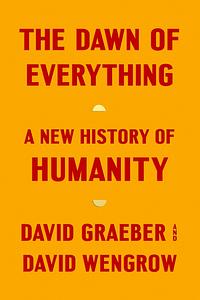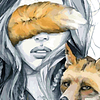Take a photo of a barcode or cover
informative
reflective
slow-paced
Shocked that this book is so popular. It’s interesting but incredibly dense and detailed, hard to stay engaged yet interesting throughout.
informative
inspiring
slow-paced
adventurous
informative
reflective
medium-paced
informative
inspiring
medium-paced
challenging
informative
reflective
challenging
informative
reflective
slow-paced
challenging
informative
slow-paced
This is an odd book. In parts absorbing, in others quite tedious, and with an irritating tone throughout (I notice other reviewers have noted the arrogance or pompousness), which I found, well, irritating. I initially gave it three stars but have revised down to two. Let’s just say 2.5.
The title is misleading. As far back as 30,000 years or so might be mentioned, but mostly it covers the Neolithic, and often far more recent times. I.e. not “the dawn”, and certainly not about “everything”, because quite a lot is left out (evolutionary theory and ecological factors, being a couple of major lacks).
Particularly irritating was the claim by the authors that the terms “egalitarian” and “equality” have no clearly defined meaning, and are therefore fairly useless, yet they continued to use the words throughout.
There are some intriguing questions and perspectives, and I feel as if I should rethink some things I thought I knew (especially in relation to early agriculture). At the same time, I had the sense that something was subtly wrong with the arguments. After reading reviews by anthropologists Chris Knight, and Nancy Lindisfarne and Jonathan Neale, I can see I was right to be suspicious. This is largely a speculative book. It provides some very detailed evidence, and yet often deals with it quite sweepingly, and sometimes misleadingly. It also ends disappointingly, without really reaching a conclusion that provides an answer to the main question of how inequality began.
Also odd was the fact that the authors were clearly familiar with feminist scholarship, took non-sexist positions, and spoke respectfully of archaeologist Marija Gimbutas, as well as providing quite a good (albeit perhaps a bit extravagant) description of Minoan Crete, but other than the occasional mention in the rest of the book, you’d be forgiven for thinking that women didn’t have a lot to do with social or political life at all. Or, more annoyingly, that the concept of inequality—leading to systems of domination—is not directly related to the relationship between the sexes (which is actually pretty crucial to understanding where it has come from and why it persists).
So, both fascinating and frustrating.
informative
inspiring
mysterious
slow-paced
Mythbusters
This book did a whole lot of debunking, refuting, and nuancing.
David Graeber and David Wengrow examine and question self-evident facts and preconceived notions about how societies have been shaped and have evolved throughout history.
The writers tackle the idea/myth that our post-industrial society today is the result of an inevitable, starkly delineated evolution: from nomadic hunter-gatherers to a settled agrarian society, to an industrial society, to our current day highly unequal mass society.
Graeber and Wengrow provide numerous examples of other possible social realities from the previous centuries/millennia.
It’s a definite eye-opener. Can you imagine societies that prioritise mutual aid and generosity - and actually mean it, and manage to ensure it? Or that live in cities for centuries without any centralised government? Or societies that allow extreme forms of violence and aggression, but only under highly specific circumstances? Or that are female-governed and war-free? Or that routinely ridicule leaders as a way of making sure they don’t fall into the trap of megalomania? Or that engage in hours of daily reasoned debate and persuasive argument to reach a new social consensus? Or that successfully reject arbitrary power, without consequence? Or that attach so much meaning and importance to dreams that an entire community is mobilised to make a specific dream from one member come true? Or that alternate between two social orders - hunting and gathering on one side, dense settlements on the other - , based on the changing of the seasons, from a dry season to a wet season?
According to David&David, imagination is the name of the game. Many of us say we’re stuck in our current system of bureaucracy, apathy, and inequality. This book invites us to use our imagination to think of alternative ways of living together in a society. In the past, people have most definitely been able to do so.
The book definitely gave me a lof of food for thought. It was pretty inspiring to read about all the different ways people used to live.
A final note: there are so many ways of organising life - so many intriguing examples - that it’s difficult to keep up. An overview of the different people/places/social orders might have been useful.
This book did a whole lot of debunking, refuting, and nuancing.
David Graeber and David Wengrow examine and question self-evident facts and preconceived notions about how societies have been shaped and have evolved throughout history.
The writers tackle the idea/myth that our post-industrial society today is the result of an inevitable, starkly delineated evolution: from nomadic hunter-gatherers to a settled agrarian society, to an industrial society, to our current day highly unequal mass society.
Graeber and Wengrow provide numerous examples of other possible social realities from the previous centuries/millennia.
It’s a definite eye-opener. Can you imagine societies that prioritise mutual aid and generosity - and actually mean it, and manage to ensure it? Or that live in cities for centuries without any centralised government? Or societies that allow extreme forms of violence and aggression, but only under highly specific circumstances? Or that are female-governed and war-free? Or that routinely ridicule leaders as a way of making sure they don’t fall into the trap of megalomania? Or that engage in hours of daily reasoned debate and persuasive argument to reach a new social consensus? Or that successfully reject arbitrary power, without consequence? Or that attach so much meaning and importance to dreams that an entire community is mobilised to make a specific dream from one member come true? Or that alternate between two social orders - hunting and gathering on one side, dense settlements on the other - , based on the changing of the seasons, from a dry season to a wet season?
According to David&David, imagination is the name of the game. Many of us say we’re stuck in our current system of bureaucracy, apathy, and inequality. This book invites us to use our imagination to think of alternative ways of living together in a society. In the past, people have most definitely been able to do so.
The book definitely gave me a lof of food for thought. It was pretty inspiring to read about all the different ways people used to live.
A final note: there are so many ways of organising life - so many intriguing examples - that it’s difficult to keep up. An overview of the different people/places/social orders might have been useful.





